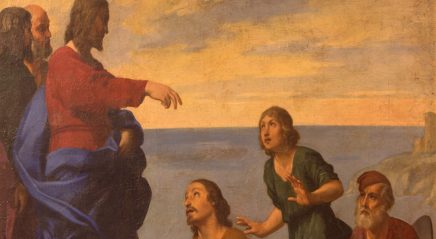It wasn’t easy for peasant fishermen in first-century Palestine to make a living. To begin with, they didn’t enjoy free access to the Sea of Galilee because the Roman Empire and its elite controlled the fishing industry.
Herod Antipas, a provincial Roman governor, romanized the region and put it under Emperor Tiberias’ control, noted Ched Myers in “‘Let’s Catch Some Big Fish!’ Jesus’ Call to Discipleship in a World of Injustice.” Antipas wanted to multiply fishing in the waters around Tiberias. He created an industry for commercial export, not local consumption. While the local people depended on fish for their main food, Antipas extracted it for profit.
Fishing also was a costly business because each step of the process was taxed. Fishermen had to get a lease from local brokers, and they had no option but to sell to Antipas’ factories, which exported fish to the entire Roman Empire. As a result, many fishermen became destitute.
Jesus spent most of his ministry in fishing villages like Capernaum, Gennesar and Magdala because there, wrote John Dominic Crossan in God and Empire (Harper One, 2009), “the radicality of Israel’s God confronted the normalcy of Rome’s civilization under Herod Antipas.”
Luke 5:1-11, included in our February lectionary readings, tells of a miraculous catch of fish and of Jesus inviting Peter to fish for people. Traditionally, we’ve understood Jesus’ statement, “fish for people,” to connote the vocation of “saving souls.” But in prophetic traditions, such as Jeremiah (16:16), Amos (4:2) and Ezekiel (29:4), to fish for people implies a divine judgment of God’s enemies.
By providing fish, Jesus demonstrates that he, not Antipas, is in control of the lake.
Why did Jesus use this metaphor?
According to the Gospels of Mark and Matthew, Jesus called on Peter; Andrew; and James and John, the sons of Zebedee, to follow him after Herod Antipas beheaded John the Baptist, possibly at his royal palace in Tiberias on the Sea of Galilee’s shores. These fishermen/disciples were victims of Herod Antipas too.
This story is not about the disciples changing their vocation from fishing for fish to fishing for people. Rather, it’s about inviting them to join Jesus in turning over Rome’s unjust social order and replacing it with God’s kingdom. Fishing for people is a political and spiritual statement against Roman imperial power. By providing fish, Jesus demonstrates that he, not Antipas, is in control of the lake.
Jesus called his disciples, who were anticipating God’s intervention to end the Romans’ oppression. Jesus preached the good news about the coming of God’s reign to replace the Roman emperor’s and Antipas’ reign. In Binding the Strong Man (Orbis 1995), Myers wrote: “[Jesus] is inviting common folk to join him in his struggle to overturn the existing order of power and privilege.”
Will we join him?









